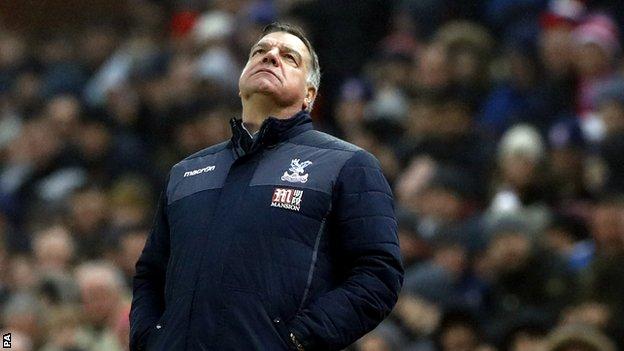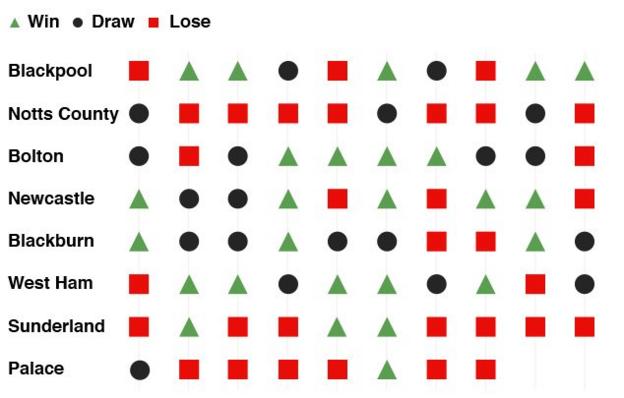Crystal Palace: Has the Sam Allardyce effect deserted Palace?
Last updated on .From the section Crystal Palace

Historically, if you need a manager to make a quick impact at a club, Big Sam tends to be your man.
Sam Allardyce has enjoyed impressive starts to life at previous clubs, including Bolton, Newcastle, Blackburn and West Ham.
So when Crystal Palace decided Alan Pardew was no longer needed in December, it made sense that the Londoners turned to the quick-fixer in their bid to remain in the Premier League.
In a BBC Sport poll, 52% of voters think that Allardyce will not be able to keep Crystal Palace up this season.
It was a swift return to the familiarity of club football for Allardyce, 62, who had suffered the ignominy of seeing his spell as England boss end after one game.
So why have the Eagles, now 19th in the table and two points from safety, not benefited from the traditional Big Sam bounce?
How bad has Allardyce's start been?
| Sam Allardyce's Premier League record | |||||
|---|---|---|---|---|---|
| Games | Win | Draw | Loss | Win % | |
| Bolton | 226 | 80 | 66 | 80 | 35.4 |
| Newcastle | 21 | 7 | 5 | 9 | 33.33 |
| Blackburn | 76 | 26 | 21 | 29 | 34.21 |
| West Ham | 114 | 35 | 28 | 51 | 30.7 |
| Sunderland | 30 | 9 | 9 | 12 | 30 |
| Palace | 8 | 1 | 1 | 6 | 12.5 |
| Total | 475 | 158 | 130 | 187 | 33.26 |
Allardyce has a reputation for achieving positive results when he joins a club mid-season and, similarly, clubs generally see a downturn in results if he leaves in mid-season.
In fact, Palace are the first team where that pattern has not continued for Allardyce.
His first eight league games in charge at Selhurst Park have produced an average of 0.5 points, the exact same average of his predecessor Pardew's last eight games before he was sacked.
Overall, this is one of the worst starts Allardyce has ever made at a new club.

Aside from Notts County, whom he failed to steer away from relegation to League Two in 1996-97 (although they were promoted again by March the next year), Allardyce is on course for his lowest points average from his first 10 league games.
Allardyce's average of 0.5 points from his eight Premier League matches at Palace is 0.4 points lower than the average for his first 10 games at Sunderland and way below the 1.8 average of his start at West Ham.
There is hope for Eagles fans, though, as Allardyce has guided the last two clubs he joined in mid-season away from the drop zone - Blackburn in 2008-09 and Sunderland in 2015-16, the latter despite eight defeats in his first 10 games.
| Where Allardyce's teams finish when he joins mid-season | ||||
|---|---|---|---|---|
| Club | Division | Joined | Position when joined | Position at end of season |
| Notts County | League One | January 1997 | 22nd | 24th |
| Bolton | Championship | October 1999 | 12th | 6th |
| Blackburn | Premier League | December 2008 | 19th | 15th |
| Sunderland | Premier League | October 2015 | 19th | 17th |
| Palace | Premier League | December 2016 | 17th | (Currently 19th) |
Why the change in fortune?
One argument could be that Allardyce has not been his usual cunning self in his first transfer window.
Allardyce spent £34.6m in January - more than he has spent in any of his first transfer windows at new clubs - and that outlay was splurged on just four players: Jeffrey Schlupp (£11.7m), Luka Milivojevic (£10.8m), Patrick van Aanholt (£10m) and Mamadou Sakho (loan fee of £1.9m).
In the 2007 summer transfer window at Newcastle, he spent a comparable £30.8m, but that was on nine players.
And his most successful start at a club - West Ham in 2011 - coincided with the mass influx of 12 new players during the summer window
It should be noted that clubs generally bring in fewer players in winter windows, and have less time to line up signings.
But Allardyce managed to bring in six players at a cost of £17.6m at Sunderland in January 2016, and went on to save the club from relegation.
Alternatively, perhaps a change in tactics is the source of Allardyce's struggles?
Renowned for his preference for a pragmatic, long-ball style of play, Allardyce seems to have forgone that approach in an attempt to play a more compact version of the game.
Only 18% of his side's passes have been long passes (defined as a pass over 35 yards with an intended target) - lower than at Newcastle, Blackburn and Sunderland.
And what about the old cliche that Allardyce's sides are the masters of the set-piece?
Allardyce has become associated with well-drilled teams when it comes to the dead ball - a threat at the opposition end and organised in their own box.
Well, Allardyce does seem to have firmed Palace up at the back in that respect, conceding from just 24% of defensive set-pieces (three of 14) since his arrival, compared with 47% (15 from 32) under Pardew this term.
But the same effect has yet to register at the other end, Palace scoring from 25% of their attacking set plays (1/4) compared with 43% (12/28) under Pardew this season.
Analysis - Can Allardyce keep Palace up?
Phil McNulty, BBC Sport's chief football writer
Crystal Palace assumed they were appointing a guarantee of Premier League safety when Sam Allardyce was hastily ushered through the door at Selhurst Park to replace sacked Alan Pardew in December.
Allardyce was the impact manager and arch-pragmatist whose record had never been stained by relegation from the Premier League, proving his ability to navigate a route out of danger at Sunderland last season, a task he performed with such success it landed him the job as England manager. Briefly.
To say the move has yet to have the desired effect is an understatement, with Palace now in a far more perilous plight than when he arrived after a home defeat by Chelsea that left them lying 17th.
Allardyce's tried and trusted methods have so far failed miserably, despite inheriting a squad that looked built for his favoured method of using wide players and a powerful striker, with Christian Benteke a disappointment, Wilfried Zaha's role reduced by his presence at the Africa Cup Of Nations with the Ivory Coast and Andros Townsend out of favour.
But is the real problem with Allardyce himself? Has the man whose concrete-clad self-confidence in everything he did been scarred by his calamitous one-match, 67-day reign as England manager, which ended after he was caught in a newspaper sting? Certainly Allardyce has not seemed the bullish, brash operator of old.
The England job was meant to be the pinnacle of his career, the job he had craved for more than a decade, not an embarrassing "blink and you'll miss it" interlude before another Premier League relegation battle.
Is the man who prides himself on breathing life into his squad battling to motivate himself to the old levels? It is hard to imagine but the loss of his managerial life's dream will have had a devastating impact, even on an experienced campaigner such as Allardyce.
There was a brief flash of the old Allardyce when he danced in front of Crystal Palace's mascot before the home game with Sunderland - but the music soon stopped as his side were 4-0 down to their relegation rivals by half-time.
It was a result that snuffed out the brief optimism of his only league win, a 2-0 victory at Bournemouth. Palace's fans are unimpressed with Allardyce and his methods, but more significantly by his results.
Palace and Allardyce simply cannot wait any longer to get their act together - they must start getting results to move out of trouble and for their manager to prove he has not arrived at Selhurst Park as badly damaged goods.







